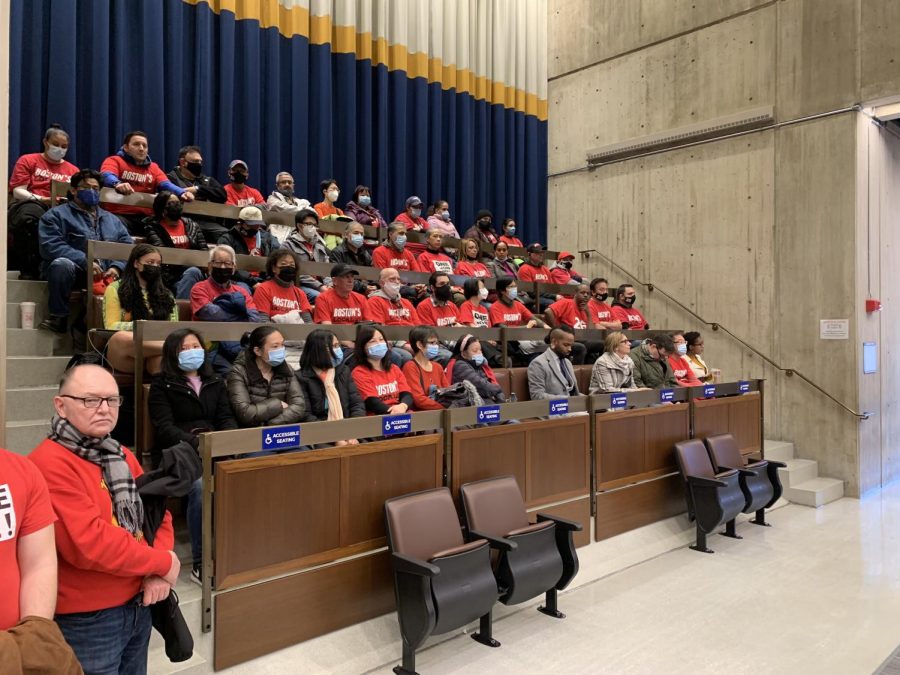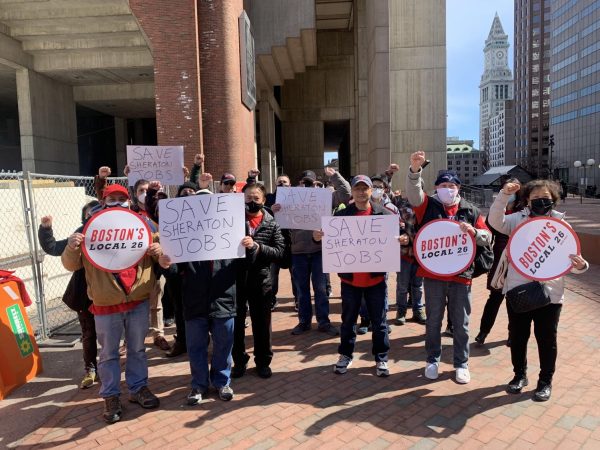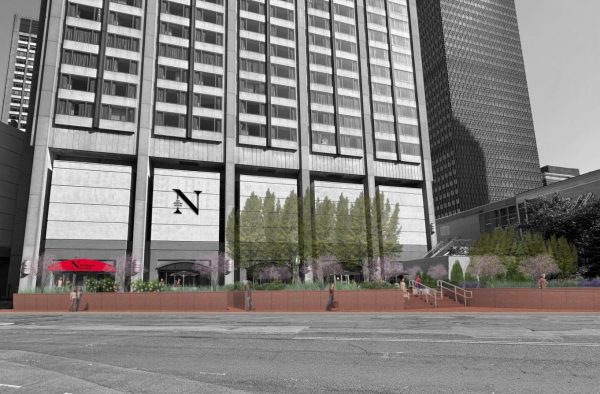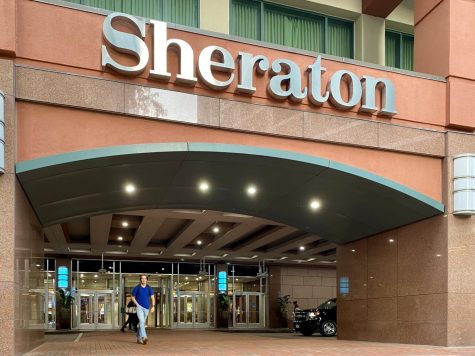Sheraton hotel workers, Northeastern students petition against creation of residence halls in Sheraton Hotel
Sheraton employees and union representatives from Boston’s Local 26 sat in on a March 23 City Council meeting, where councilors unanimously passed a resolution opposing the conversion of hotel rooms into permanent dormitories. Photo courtesy of UNITE HERE Local 26.
April 15, 2022
Northeastern students joined together with Sheraton hotel employees to create a petition in protest of the creation of permanent dormitories in the Sheraton Boston Hotel, a move that could result in the loss of over 100 union jobs for the hotel employees.
The Sheraton Boston Hotel is one of several hotels in the Boston area that Northeastern has leased as temporary dormitories for undergraduate students. During this time, the previous owners, Host Hotels & Resorts, sold the hotel to the joint venture between Värde Partners and Hawkins Way Capital Feb. 2.
“The pandemic is driving this opportunity among distressed hospitality and select housing assets in gateway markets with high demand for certain alternative hospitality, residential, and student housing products,” wrote Francisco Milone, a partner at Värde Partners, in a statement posted to the website.
Recently, the new owners released a report indicating they are considering converting 427 of the rooms in the Sheraton Hotel into permanent housing for students.
“Right now, there’s a few workers who are working cleaning the bathrooms and the areas and taking care of the rooms, but the original plan is only through May this year. If [the new owners] go ahead with the plan and turn the entire South Tower, that’s hundreds of rooms, into dorms permanently, then a lot of housekeepers, a lot of other workers would lose their jobs,” said Chui Law, an employee of the Sheraton Boston Hotel for more than 30 years.
The employees who would be affected by this change did not find out about the potential change until it was introduced at a neighborhood meeting.
“It should be the new owners who should be broaching the subject with the workers when they want to [make this change], but they did not. There was no discussion about this at all,” Law said.
Law was among the employees, all members of the union Boston’s Local 26, who protested this change and brought it to the attention of both Northeastern student groups and Boston city councilors.
In response to the news, members of student organization Huskies Organizing With Labor, or HOWL, created an online petition to “Save Sheraton Jobs,” with the goal of spreading awareness among students and eventually sharing the petition with the university administration and the owners of the Sheraton to convince them to stop the conversion.
Although HOWL members are in favor of improving student access to housing, they recognize the damage that converting the Sheraton Hotel to dormitories would do to the employees.
“I’d like to emphasize the fact that this could cost 60 to 100 good, full-time union jobs,” said Noble Mushtak, a third-year computer science and mathematics combined major who is part of HOWL’s events team.
HOWL members also recognize that the conversion would have broader impacts on the tourism industry and associated jobs in the surrounding area.
“The Sheraton is one of the largest hotels in Boston, so the tourism in Back Bay would really be hampered if it was just a lot of students living in the South Tower because students aren’t as likely to stimulate the economy as much tourists are,” said Benjamin Brown, a first-year chemical engineering major who is a member of HOWL’s media team.
The possibility of converting these rooms evoked a similar response from city councilors as on March 23, employees and union representatives gathered at the Boston City Hall Chambers to advocate for their rights as union workers, asking for city councilors to support the Sheraton Hotel employees.
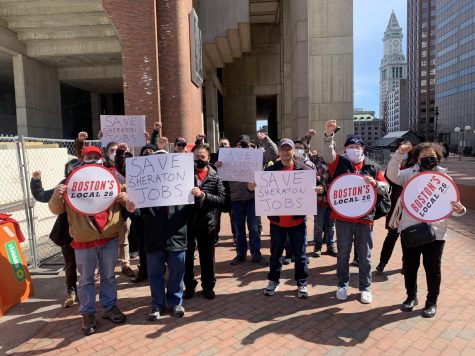
The resolution offered by City Councilors Ed Flynn, Ruthzee Louijeune and Tania Fernandes-Anderson indicated that the City Council would stand with the employees to prevent job loss and encourage recovery from the pandemic. The resolution was passed unanimously at the March 23 meeting.
“The driving force behind my vote was how said conversion would likely eliminate over 100 jobs — jobs largely held by people of color, women, and immigrants,” Fernandes-Anderson wrote in an email statement to The News April 7. “These workers, who were there for us during the worst days of the pandemic, have done nothing wrong and deserve to remain gainfully employed. While I recognize the need to house our college students, such attempts to do so should not sacrifice the jobs of our working class.”
The resolution also cites the damage the change could do to Boston’s status as “a world-class destination for domestic and international travelers,” arguing to protect the employees who were hard-hit by the pandemic in order to improve tourism.
Although this resolution will not prevent the conversion, employees and union representatives are hopeful that it will give the owners reason to reconsider converting these rooms into dormitories.
“I felt very comforted by the fact that the city council passed that resolution,” Law said. “It’s like we won the first step of the fight, because they have pledged their support, because they understand what this is about.”
For the employees whose jobs are at risk, this change is about more than just losing a paycheck — as union workers, they receive benefits including comprehensive healthcare and a pension fund, in addition to fair wages and regular raises.
These benefits came after more than 1,500 employees at various Marriott hotels in Boston, including the Sheraton Boston Hotel, went on strike in 2018 demanding better contracts. Many of the employees currently protesting the conversion were involved in the strike, including Law.
“We went on strike for 46 days. Every day, we needed to picket line from outside, the weather is wet and cold, and sometimes snowy and sometimes windy, but we [wanted] to fight for a good contract,” she said. “Forty-six days was not easy. Every day we [stayed] outside. But we won. We won a very, very good contract.”
The unionized housekeepers, attendants and other employees at risk of losing their job hope that the same perseverance may be effective during these protests in convincing the new owners to halt the conversion.
Although Northeastern administration has not collaborated with Värde Partners or Hawkins Way Capital on their proposal, they indicated that they would be interested in obtaining the rooms as student housing.
“Should [the new owners] choose to establish dorms there and the project is approved, then Northeastern would potentially be interested in a partnership to house some of our students there,” Northeastern spokesperson Shannon Nargi wrote in an email statement to The News April 6.
Members of HOWL indicated that they are also opposed to the conversion because, in addition to the loss of jobs, it would be damaging to the student experience.
“For students getting to the Sheraton tower, it’s not ridiculously far from campus but it’s far enough to the point where the commute from Northeastern’s campus to the Sheraton is kind of long. It makes motivation to go to classes [go] down and lowers the student experience a lot,” Brown said.
The employees hope that Northeastern students and administration will work with Local 26 to help prevent this conversion and save local jobs.
“I hope that everybody, the students and Northeastern will actually support us,” Law said. “It’s really our hope that the entire South Tower becomes a hotel again, and it’s fine that it’s housing students temporarily, but in order to save everybody’s jobs, the whole building, both the towers, need to be a hotel.”


